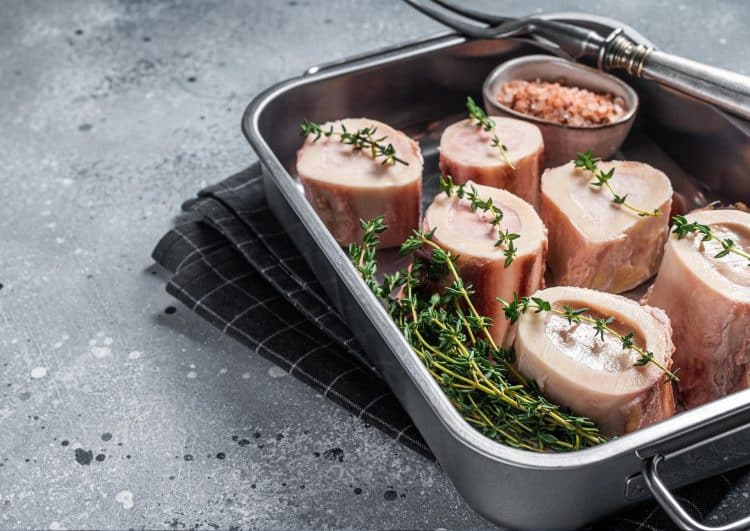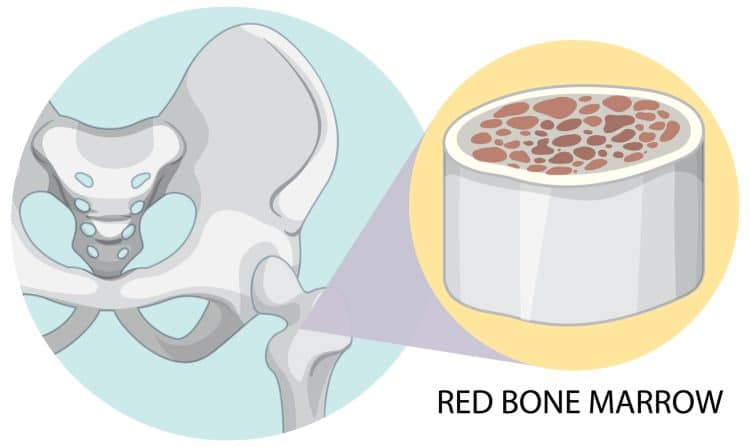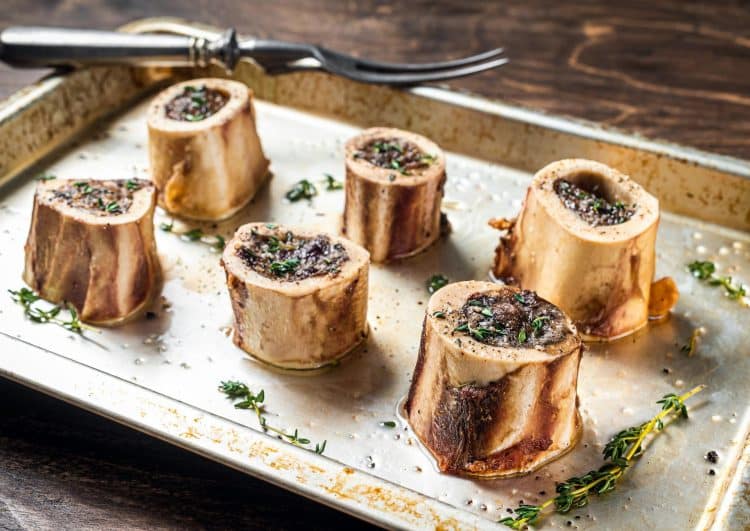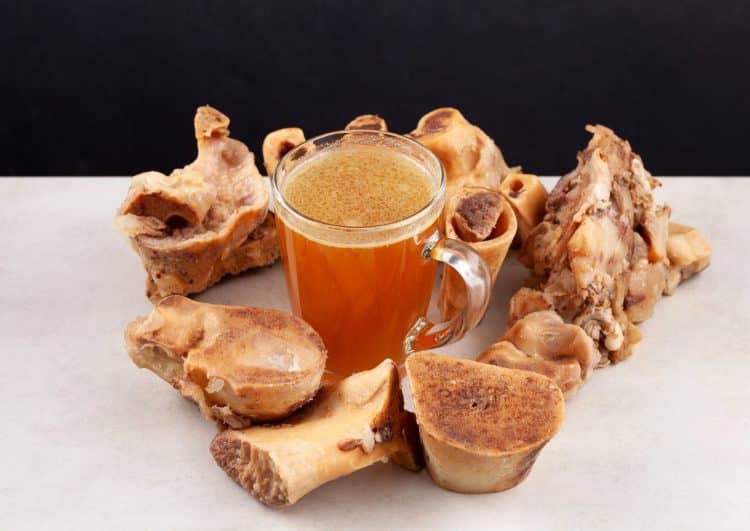Bone marrow is an ancient source of nutrition. People have been consuming bone marrow for as long as they’ve been eating animals.
Recently, and largely because of the rise in popularity of the Paleo or caveman diet, bone marrow has become very trendy, and a lot of people consume it for its health benefits. It’s also a delicacy in some cultures, where it’s eaten for its unique flavor and texture.
But is bone marrow good for bodybuilders? And, what is the best way to use it if it is? We reveal the answers!
What is Bone Marrow, Anyway?

Bone marrow is the soft tissue found in the center of bones. You’ll find bone marrow in most bones, but it’s most concentrated in the thigh and hip bones and the spine. The most common types of bone marrow for human consumption come from cow and lamb bones. However, moose and caribou are also popular in parts of North America.
The bone marrow is where blood cells are formed. Red blood cells carry oxygen, while white blood cells fight infection. Platelets, another type of blood cell, aid in clotting. Bone marrow is also a source of collagen, which is a type of protein.
With its rich, savory/sweet flavor, bone marrow is considered to be a delicacy. It is often eaten as a spread with toast, used as a base for soups and stews, or served with vegetables.
Nutritional Values for Bone Marrow
Bone marrow is high in calories and nutrients. One tablespoon (14 grams) of bone marrow contains:
- Calories: 110
- Total fat: 12 grams
- Protein: 1 gram
- Vitamin A: 1% of the RDI
- Vitamin B12: 7% of the Reference Daily Intake (RDI)
- Vitamin E: 2% of the RDI
- Iron: 4% of the RDI
- Phosphorus: 1% of the RDI
- Riboflavin: 6% of the RDI
- Thiamine: 1% of the RDI

Bone marrow contains several other nutrients, including CLA, collagen, glycine, glucosamine, and chondroitin, all of which are beneficial for bodybuilders.
The Benefits of Bone Marrow for Bodybuilders
While there are no specific studies of any merit on the effects of bone marrow, there is plenty of research on its key components, some of which are of particular benefit to bodybuilders.
The main benefits of bone marrow for bodybuilders are:
Better joint health
Lifting weights can be hard on your joints. Regular training increases the wear and tear of the articular surfaces that coat and protect the ends of your joints – the hyaline cartilage. As this cartilage wears away, joints can become stiff and painful, leading to osteoarthritis.
Bone marrow contains several compounds linked to better joint health, namely glucosamine, chondroitin, and collagen. These compounds are thought to reduce joint wear and tear and may even help repair damaged cartilage (1).
So, if your knees, hips, or shoulders are feeling the strain after years of heavy lifting, adding bone marrow to your diet could provide some relief so you can continue training well into your old age.

Reduced inflammation
Inflammation is the swelling and reddening of the soft tissues, including muscle, tendons, and ligaments. Inflammation is invariably accompanied by pain.
Short-term inflammation is part of the bodybuilding process and one of the triggers for hypertrophy. However, long-term inflammation can lead to long-lasting pain and can even affect your health.
Bone marrow contains the amino acid glycine, which is a powerful anti-inflammatory nutrient (2). Using bone marrow may help reduce the inflammation that affects your muscles between workouts. With less inflammation, you may even find you can train more often and build muscle faster.
Faster injury repair
Even if you warm up properly and train with good exercise technique, injuries sometimes happen anyway. While you may be able to train around a pulled biceps or minor pec train, invariably, injuries can affect your long-term bodybuilding progress, not to mention your training enjoyment.
The collagen and glycine in bone marrow may help speed up recovery from injuries. These compounds increase protein synthesis, which is the repair and renewal of muscle tissue (3). Eating bone marrow may mean that soft tissue injuries heal faster.
Improved skin health
Bone marrow is a source of collagen, the most abundant protein in your body. As we age, collagen levels start to decrease, and, as a result, skin loses its elasticity. Wrinkles and stretch marks are often more noticeable because of this collagen deficiency.
The collagen in bone marrow can help supplement natural collagen, so your skin retains its elasticity for longer. As a result, your skin will look healthier.
While skin health doesn’t directly impact bodybuilding, it’s part and parcel of the whole aesthetic of training to look good. Big muscles covered in wrinkles will never be as attractive as the same physique with more elastic, youthful-looking skin.
How to Make Bone Marrow

You can buy bone marrow in its extracted form from health food shops and some butchers. However, it’s almost as easy (and far more cost-effective) to prepare it yourself.
Buy some bones, such as:
- Knuckle marrow bones
- Shin marrow bones
- Neck marrow bones
- Oxtail
- Shank marrow bones
Split the bone lengthways (ask your butcher to do this if you wish) to allow easy access to the marrow, and then roast in the oven at 450 F or 230 C for 15 minutes. Scoop out the soft marrow after cooking and eat or store for later.
You can use bone marrow as a spread on bread or crackers or as a base for soups and stocks. A tablespoon is the recommended serving size. Remember that, because of its fat content, bone marrow is high in calories. Make sure you account for the extra calories if you want to avoid gaining weight.
Bone Broth – An Alternative to Bone Marrow
The biggest problem with bone marrow is that even large bones don’t contain all that much, and you have to work pretty hard to obtain it. It’s also very high in fat and calories. Bone broth may be a viable alternative as it’s relatively easy to make but still rich in the same nutrients.

Bone broth is made by simmering the bones and connective tissues of animals. The resulting broth is very nutritious and contains many of the same nutrients as bone marrow, plus a few additions. Bone broth is also lower in fat and calories, so it’s more weight-control friendly.
One cup of bone broth contains 86 calories, 6 grams of protein, 2.9 grams of total fat, and 8.5 grams of carbohydrates. It also contains 7 mg calcium, 0.5 mg iron, 10 mg magnesium, 252 mg potassium, 0.34 mg zinc, and 343 mg sodium.
Bone broth is easy to make, although it can be a little time-consuming. However, you can buy bone broth powder, and some cafes and coffee shops even sell bone broth to go.
Ingredients for making bone broth:
- 1 gallon (4 liters) of water
- 2 tbsp (30 mL) apple cider vinegar
- 2–4 pounds (about 1–2 kg) of animal bones
- Salt and pepper to taste
Directions:
- Place all ingredients in a large pot or slow cooker.
- Bring to a boil.
- Reduce to a simmer and cook for 12–24 hours. The longer it cooks, the better it will taste and the more nutritious it will be.
- Allow the broth to cool. Strain it into a large container and discard the solids.
Consume as it is, or add your bone broth to soups, sauces, stews, etc. You can also flavor it with herbs and spices.
Bone Marrow for Bodybuilding – Wrapping Up
Bone marrow is nothing new, and people have been eating it for thousands of years. In fact, bone marrow was once so highly prized that it was reserved for guests, elders, and the sick.
The nutrients in bone marrow are very beneficial for bodybuilders. It could help you recover faster between workouts and from injuries, reduce joint pain, and give you healthier, more elastic skin. Bone broth offers many of the same benefits and is usually higher in essential nutrients and lower in calories, not to mention being easier to make.
If messing about with bones is not your idea of fun, you can also buy readymade bone broth powder and bone marrow supplements. However, they can be expensive, and making your own is far cheaper.
References:
1. PubMed: Effects of Glucosamine and Chondroitin Sulfate on Cartilage Metabolism in OA: Outlook on Other Nutrient Partners, Especially Omega-3 Fatty Acids https://www.ncbi.nlm.nih.gov/pmc/articles/PMC3150191/
2. PubMed: L-Glycine: A Novel Anti-Inflammatory, Immunomodulatory, And Cytoprotective Agent https://pubmed.ncbi.nlm.nih.gov/12589194/
3. PubMed: The Effects of Collagen Peptides on Muscle Damage, Inflammation and Bone Turnover Following Exercise: A Randomized, Controlled Trial https://pubmed.ncbi.nlm.nih.gov/30783776/
4. PubMed: Oral Supplementation of Specific Collagen Peptides Has Beneficial Effects on Human Skin Physiology: A Double-Blind, Placebo-Controlled Study https://pubmed.ncbi.nlm.nih.gov/23949208/


